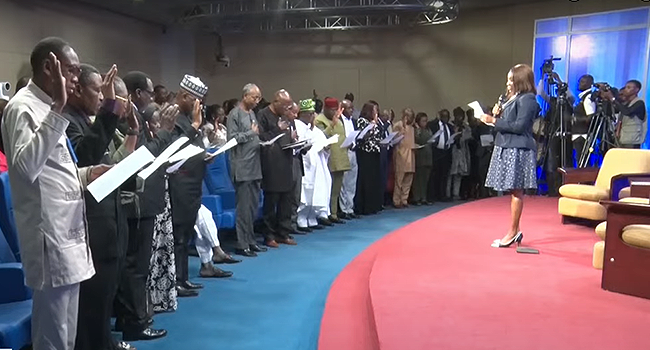History was made on Tuesday as the Society of Nigerian Broadcasters (SNB) inducted the first batch of its members in Lagos State.
The event, which was held in the amphitheatre at Channels Television Global Headquarters, had veterans in the profession, including former Nigeria Television Authority (NTA) Directors General, Vincent Maduka and Shyngle Wigwe, and inductees from across broadcast platforms, in attendance.
Giving his keynote speech at the induction, the Chairman, Channels Media Group, Dr. John Momoh, OON, painted a picture of the changing media landscape in the light of digital transformation, and challenged players in the industry to adapt.
“It is obvious that the digital age has led to massive disruption in its sector of the business,” Momoh said. “And as a result of these changes, content creators are one step closer to the audiences, which now wield a greater power in determining what is served by the media.
“Responsible journalism entails that whatever facts and figures are gathered are cross-checked, double-checked and triple-checked and reconfirmed before presenting such to the public for consumption.
“Remember, any misinformation by the media is always difficult to retrieve and effects could be devastating. So, let’s place the interests of the citizens above that of the politicians. Let us live true to our role as the watchdog of the society and shun all rhetoric that is divisive and offensive in nature.”
Executive Secretary, Broadcasting Organisations of Nigeria (BON), Dr. Yemi Bamgbose stated that the inauguration served as a means to build a solid foundation laid by progenitors of the practice.
“A functional SNB however will help in no small way to professionalise the practice of broadcasting, serve as the advocacy body for the practitioners, and bridge the gap between the old and new practitioners,” he said.
Other veterans in the auditorium praised the emergence of the SNB, describing it as an idea whose time has come. They weighed in on the critical issue of maintaining standards and provided answers to the question of who should regulate the broadcasting profession.
Maduka called on practitioners to consider a situation in which the regulation of the profession of broadcasting was in the hands of broadcasters themselves or, as he says, “self-regulation.”
Similarly, Wigwe noted that with the establishment of an institute for training broadcasters, it becomes essential that broadcasters are trained “because it is important that when we have broadcasters, there is a way you have to judge broadcast as somebody who is fit to be in that place.”
Another veteran broadcaster, Ambassador Yemi Farounbi pointed out the overcrowded broadcast landscape encompassing a myriad of radio and television stations such that the ability of practitioners had been undermined.
“In Ibadan where I live, there are 40 stations. Yes, the population can support it, but the economy cannot, and so you have so many stations now looking for buyers because they are unable to economically run the station,” he said.
The event broke into a panel discussion and the panellists, including veteran broadcasters, Bashorun Kehinde and Lekan Ajia; and former DG, Ekiti State Broadcasting Service, Segun Aderinye, shared their thoughts on various issues affecting the media practice in the country.
Inductees took their sworn statements on oath promising to uphold and protect the interest of the society. The presentation of certificates to the inductees marked the end of the society that seeks to, among other things, coordinate set standards and abridge all professional broadcasters in the country.


